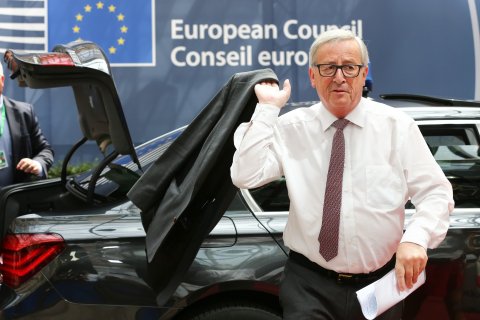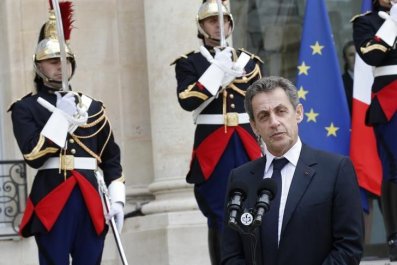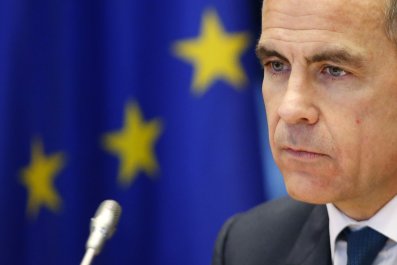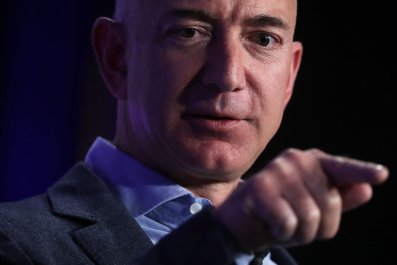When Jeffrey Bezos was deciding where to base his new e-commerce business in 1995, Seattle was not his first choice. Instead, the CEO of Amazon, now the world's largest online store, eyed an Indian reservation near San Francisco that would have considerably lowered his tax bill.
The state of California quashed that scheme, but Bezos's zeal for tax avoidance did not stop there. Throughout much of Amazon's more than 20-year history, he has carved out competitive tax positions for the company as it expanded globally. His business acumen in that regard has even attracted the wrath of presumptive Republican presidential candidate Donald Trump, who earlier this year accused Bezos of buying The Washington Post to gain political influence and avoid taxes. During a speech in Texas, Trump said, "If I become president, oh do they have problems. They're going to have such problems."
[Related: How Jeff Bezos Is Hurtling Toward World Domination]
Newly revealed documents seen by Newsweek from a landmark court case in Seattle between Amazon and the IRS reveal how the company has attained global dominance over competitors in part by moving its global headquarters to the small, landlocked state of Luxembourg. While Amazon's corporate structure there has been well-documented, the court documents from Seattle shed new light on allegations of tax avoidance. They also raise questions about how and why Luxembourg handed one of the world's largest companies a tax deal that private citizens can only dream of.
At the heart of Amazon's arrangement with Luxembourg is Jean-Claude Juncker, who was that country's prime minister between 1995 and 2013 and is now president of the European Commission, the European Union's executive branch.
Following the "LuxLeaks" revelations in 2014, which exposed many of Luxembourg's cozy tax deals with multinationals, Juncker's position at the EU came under intense scrutiny, with some in the European Parliament calling for his resignation. Through it all, Juncker has distanced himself from the taxation deals made by his government. "It's the tax authorities that develop the specific rules that are applied," he said last September during a hearing of the European Parliament. "I haven't taken a position on individual tax dossiers because that also isn't my role. The Luxembourg tax authorities are very allergic to the idea of ministerial interference."
But documents from the Seattle court case show a very different version of events. In a brief to the tax court in Seattle, the IRS says Juncker met with four senior Amazon tax officials between September 9 and 12, 2003. The officials included Bob Comfort, a key player in setting up Amazon's European tax structure; Jocelyn Krabbenschmidt, who served as Amazon's director of global direct tax from 1999 until 2012; and Jeroen Pit, Amazon's head of EU VAT (value-added tax). "Amazon tax executives met with the Luxembourg prime minister," the documents state.
This evidence of a meeting between Juncker and Amazon's top tax officials at a key moment in the company's negotiations with Luxembourg could hasten the work already underway by the European Parliament's Special Committee on Tax Rulings, which has questioned Juncker and a host of multinational companies—including McDonald's, Google and Apple—about how they calculate their taxable revenues.
Sven Giegold, a German lawmaker in the European Parliament who has challenged Juncker in the past over his role in Luxembourg's taxation policies, says the revelations concerning Juncker's meeting with key Amazon officials were extremely worrying. "Given that Juncker met senior Amazon tax officials, it is beyond belief that tax questions weren't discussed in these meetings," he tells Newsweek.
Alex Cobham, director of research at the Tax Justice Network, an international network of organizations fighting tax avoidance, says there were four main actors in the LuxLeaks scandal: the multinationals, some of which are having their tax-planning practices investigated; whistleblowers Antoine Deltour and Raphael Halet, who were handed suspended sentences and fines by a Luxembourg court for theft and breaking strict professional-secrecy laws; the tax advisers at several global accounting companies; and the politicians who approved the deals.
[Related: Trump Accuses Amazon of 'Getting Away With Murder' on Taxes]
But at no point in time since revelations appeared about Luxembourg's sweetheart deals has Juncker, or any other politician in his home country, been held to account for what is the biggest distortion of corporate tax collection to ever be publicly exposed, Cobham says. He adds that "if this [meeting between Juncker and Amazon's tax officials] shows a direct involvement in effectively marketing Luxembourg for this purpose, you have to think his position [as European Commission president] is untenable."
A spokesperson for Juncker tells Newsweek that "it [was] entirely normal" for Juncker to have met with representatives of companies seeking to invest in the country and that "any decisions related to the tax arrangements of large companies during his time in office were...strictly a matter for the tax administration."
His defenders also point out that as the European Commission's president, Juncker has pushed for laws to curtail aggressive tax planning. In January, the commission presented its anti-tax-avoidance package, which member states formally backed last month. The package attempts to block the most common methods used by companies to avoid paying taxes, such as the artificial shifting of profits to low-tax jurisdictions. Juncker's commission has also pushed a proposal that would oblige multinationals to disclose profits earned and taxes paid in each of the EU's 28 member states and other fiscal havens.

Still, Juncker is having to answer questions about his role in the LuxLeaks affair. In a 2014 interview with d'Lëtzebuerger Land, a Luxembourg newspaper, Amazon's Comfort revealed that during a meeting with state officials, Juncker reportedly told Amazon he would try to help if the company encountered any problems in setting up its Luxembourg operations. Comfort, who was made an honorary consul for Luxembourg in 2011, also says officials promised to expedite visas and help facilitate schooling for Amazon employees' children.
In an email, Giegold says that Juncker's response to questions over his role in Luxembourg's taxation regime for multinationals was to make the public believe that, as prime minister, he only met with "future-orientated companies" to diversify the structure of Luxembourg's economy. "In fact, during his term of office, Juncker made tax dumping the new business model of the Grand Duchy."
Project Goldcrest
Amazon's IRS case in the U.S., which could force it to pay more than $1.5 billion in unpaid taxes, has revealed some findings that are, at best, awkward for the company. According to court documents, Amazon hired an economist from the global financial advisory company Deloitte in 2001 to review the various approaches that could be adopted to reduce its taxes.
As Amazon's director of global direct tax, Krabbenschmidt was responsible for estimating the cost benefits of establishing the company's headquarters in Luxembourg and implementing a new tax regime through a labyrinth of subsidiaries designed to shift profits into Luxembourg. Amazon dubbed the tax-planning initiative Project Goldcrest, a title worthy of a James Bond thriller.
Project Goldcrest, which is still in place, uses a series of complex intercompany contracts to transfer intangible assets—vital software, trademarks and other intellectual property (IP)—to one of Amazon's Luxembourg companies, Amazon Europe Holding Technologies. A separate subsidiary, Amazon EU Sarl, then pays AEHT huge sums every year in royalty fees, reducing the amount of taxable income within the company.
In return for controlling the European licensing rights, AEHT makes payments to one of Amazon's U.S. companies. U.S. authorities believe these payments are too low, which is why the case has gone to court. Amazon has largely avoided federal taxation by managing its books to avoid reporting any meaningful profits over the past 20 years. In the last quarter of 2015, for example, Amazon paid just $73 million in taxes on $35.7 billion in revenues.
After it audited Amazon's 2005 and 2006 tax filings, the IRS questioned the amount of taxes the company was paying into U.S. state coffers. Documents outlining the IRS findings show that Amazon hid key data from the IRS during an audit of the company's tax arrangements in Luxembourg. It did this by hiding part of its model projecting tax benefits from Project Goldcrest, not providing the IRS with part of the model titled "S Team Meeting," a senior leadership outfit that reports directly to Bezos. The court documents also show that Amazon's chief financial officer, Tom Szkutak, "was briefed on the projected tax benefits" from Project Goldcrest before its implementation in 2006.
Queried about the missing data, an Amazon spokesperson says, "Amazon pays all the taxes we are required to pay in every country where we operate."
The spokesperson explained that Amazon's corporate tax payments are based only on profits and not revenues, and profits have remained low for much of the past 20 years because of Amazon's heavy investments in specialized staff and projects such as data centers. Amazon also says its profits are low because it is in a "highly competitive, low-margin business."
Tax justice campaigners are outraged by the evidence suggesting Amazon withheld key information from the IRS. "We always tend to give the benefit of the doubt to multinationals and talk about avoidance rather than evasion. But hiding relevant material does suggest the crossing of that line," says the Tax Justice Network's Cobham.
The IRS also presents a compelling case that Amazon conducted an improper valuation of the IP assets it transferred to Luxembourg in order to undervalue them.
Since 2014, the European Commission's competition services have embarked on a similar inquiry due to suspicions that Amazon has inflated royalty payments for the use of IP rights paid to one of its subsidiaries in Luxembourg. Margrethe Vestager, the EU competition commissioner, who is conducting the investigation, is expected to report back soon with a verdict on whether the deal with Luxembourg amounted to illegal state aid.
Jack Blum, a leading white-collar defense attorney in the U.S. specializing in money laundering, tells Newsweek there is no doubt about the premeditated nature of Amazon's aggressive tax planning. "It's a system that is beyond the capacity of governments, or for that matter the public, to really understand, and it allows the corporations tremendous ability to play games and in a way that negates the effectiveness of national tax systems," he says. "For the most part, this is stuff that is kept in the deepest, darkest recesses of tax courts and corporate vaults, protected by secrecy provisions."
Hiding in Complexity
As Amazon began planning its move to Luxembourg from the U.S. in 2001, documents show there was resistance from the company's head of European retail, Diego Piacentini. He told the U.S. court he was not in favor of moving Amazon's EU headquarters because "it was necessary to recruit a lot of people to work there and Luxembourg was small."
But his concerns were ignored. Instead, the company embarked on a complex series of actions that involved dozens of subsidiaries in more than a half-dozen countries, with the aim of carving out an extremely advantageous tax rate, one that would be way below the official amount asked from corporations in the U.S. and many European countries.
The IRS has deduced that "the creation of the Luxembourg headquarters was to pay as little tax as possible in Europe," the court documents show.
The findings from the IRS and the European Commission will further fuel tensions between the U.S. and Europe over how to tax multinationals on both side of the Atlantic, as authorities race to recover vast sums from Amazon's multimillion-dollar pool of untaxed income held in Luxembourg.
Amazon has some powerful supporters, including U.S. Treasury Secretary Jack Lew, who has criticized the EU for "unfairly" pursuing American companies in an attempt to recover vast sums from untaxed income. Vestager has denied such allegations on several occasions. Earlier this year, she ordered the Belgian government to claw back 700 million euros ($775 million) in unpaid taxes from 35 multinationals, most of which come from Europe. She also has an ongoing investigation into large European truck makers such as DAF and Scania, which are suspected of fixing prices and dragging their feet on introducing new emissions standards.
Until there's a ruling on the IRS case in Seattle, Amazon's position in Luxembourg is safe, in no small part due to the complexity of Project Goldcrest. Such aggressive tax regimes, Blum says, "create so many layers of complexity that no auditor for a national tax service can possibly penetrate it."





















